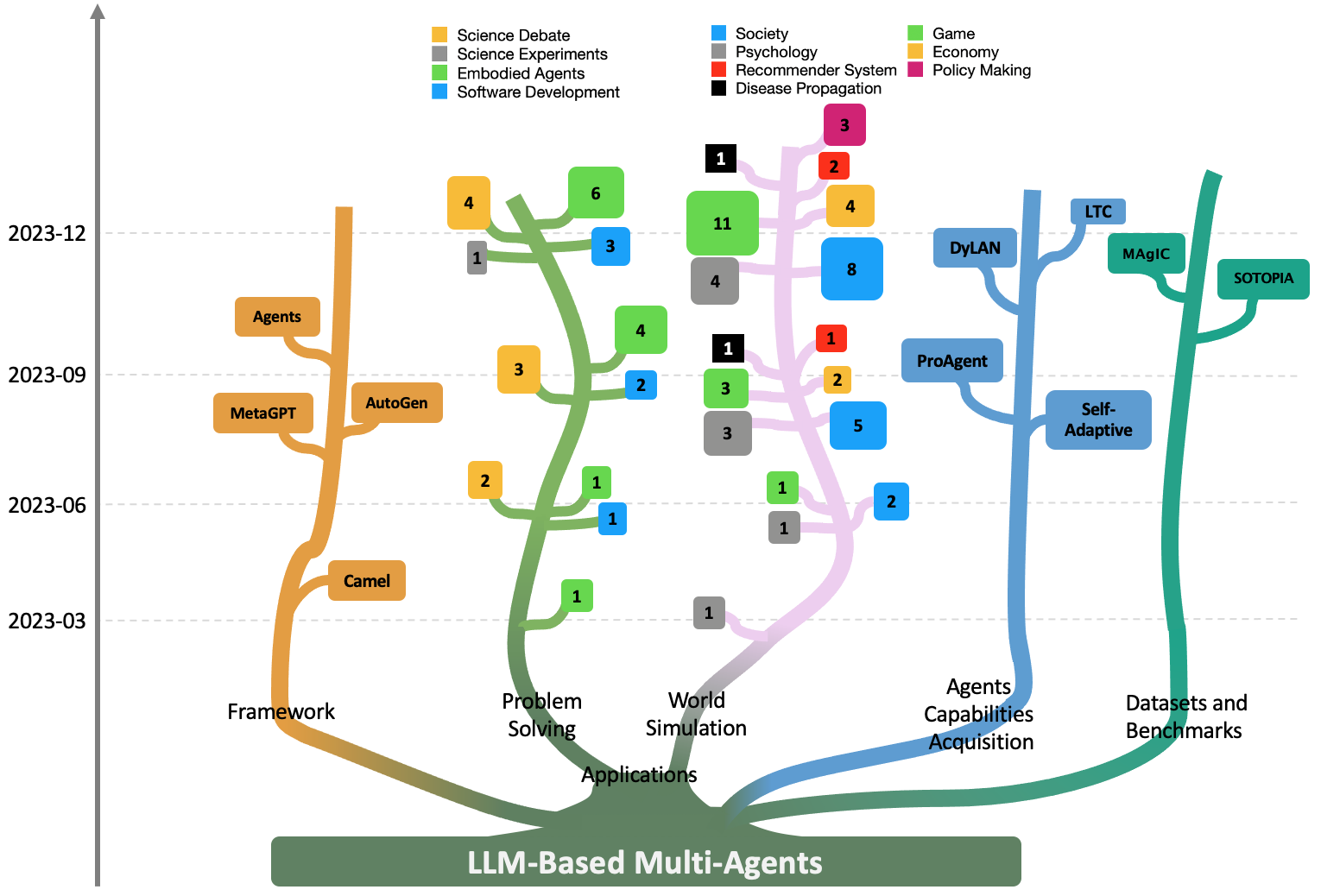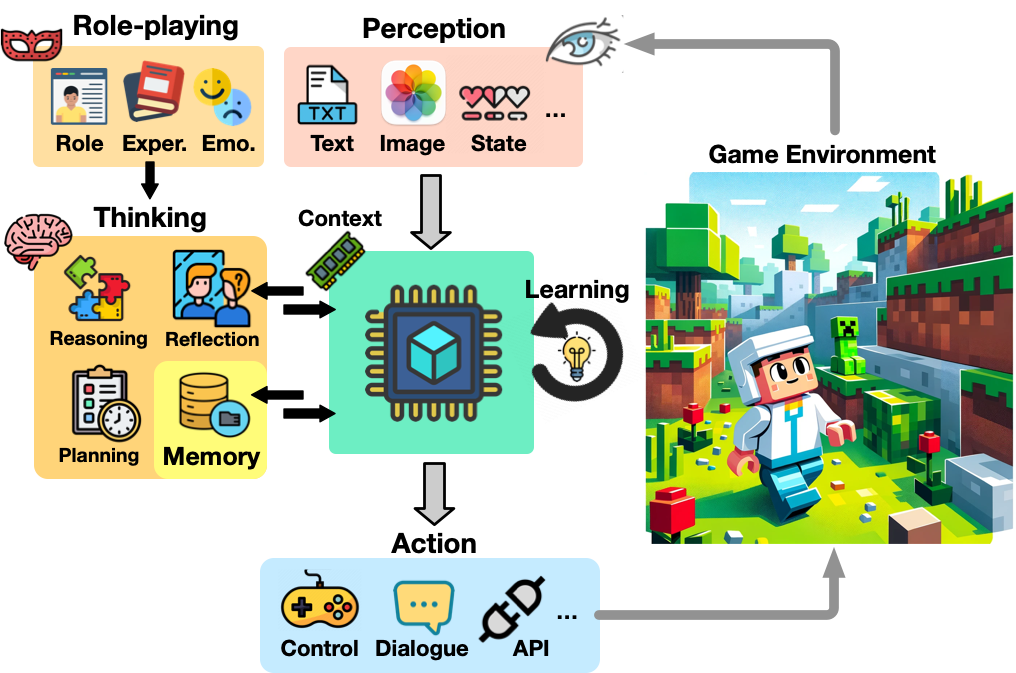Exploring Autonomous Agents through the Lens of Large Language Models: A Review
2404.04442

0
0

Abstract
Large Language Models (LLMs) are transforming artificial intelligence, enabling autonomous agents to perform diverse tasks across various domains. These agents, proficient in human-like text comprehension and generation, have the potential to revolutionize sectors from customer service to healthcare. However, they face challenges such as multimodality, human value alignment, hallucinations, and evaluation. Techniques like prompting, reasoning, tool utilization, and in-context learning are being explored to enhance their capabilities. Evaluation platforms like AgentBench, WebArena, and ToolLLM provide robust methods for assessing these agents in complex scenarios. These advancements are leading to the development of more resilient and capable autonomous agents, anticipated to become integral in our digital lives, assisting in tasks from email responses to disease diagnosis. The future of AI, with LLMs at the forefront, is promising.
Get summaries of the top AI research delivered straight to your inbox:
Overview
- This paper explores the use of large language models (LLMs) in building autonomous agents, which are AI systems that can act independently to achieve goals.
- The paper provides a broad review of research on LLM-based autonomous agents, covering topics like game agents, educational applications, and multimodal models that combine language and vision.
- The paper aims to help researchers and developers better understand the current state of the art in this rapidly evolving field.
Plain English Explanation
Large language models (LLMs) are powerful AI systems that can understand and generate human-like text. Researchers have been exploring how to use LLMs to create autonomous agents - AI systems that can act independently to achieve goals, without constant human supervision.
This paper gives an overview of the different ways researchers are using LLMs to build autonomous agents. For example, some researchers are using LLMs to create game agents that can play complex video games. Others are exploring how LLMs could be used in educational applications, like chatbots that can tutor students. The paper also covers multimodal models that combine language understanding with computer vision, allowing autonomous agents to perceive and interact with the visual world.
The goal of this paper is to help researchers and developers better understand the current state of the art in this exciting and rapidly evolving field. By exploring the latest advances and ideas around LLM-based autonomous agents, the paper aims to inform and inspire future work in this area.
Technical Explanation
The paper begins by providing background on large language models (LLMs) and how they form the foundation for many LLM-based autonomous agents. LLMs are deep neural networks that are trained on vast amounts of text data, allowing them to understand and generate human-like language. The authors explain how these powerful language models can be leveraged to create autonomous agents - AI systems that can perceive their environment, reason about goals and actions, and act independently to achieve those goals.
The paper then reviews several key areas of research on LLM-based autonomous agents. One section focuses on the use of LLMs to create game agents - AI players that can competently navigate and succeed at complex video games [https://aimodels.fyi/papers/arxiv/survey-large-language-model-based-game-agents]. Another section examines educational applications of LLMs, such as AI tutors and learning companions [https://aimodels.fyi/papers/arxiv/large-language-models-education-survey-outlook]. The paper also covers multimodal LLMs that combine language understanding with computer vision, enabling autonomous agents to perceive and interact with the physical world [https://aimodels.fyi/papers/arxiv/review-multi-modal-large-language-vision-models].
Throughout the review, the authors highlight important research directions and open challenges in the field of LLM-based autonomous agents. For example, they note the need to improve the safety and robustness of these systems, as well as the challenge of endowing them with common sense reasoning and robust goal-oriented behavior [https://aimodels.fyi/papers/arxiv/how-can-large-language-models-enable-better].
Critical Analysis
The paper provides a comprehensive and well-structured overview of the current state of research on LLM-based autonomous agents. The authors do an excellent job of covering a wide range of applications and highlighting key research directions and open challenges in the field.
One potential limitation of the paper is that it does not delve deeply into the specific technical details and architectures of the LLM-based autonomous agents discussed. While the high-level review is valuable, readers interested in the nuts and bolts of these systems may wish for more in-depth coverage.
Additionally, the paper does not critically examine some of the potential pitfalls or ethical concerns surrounding LLM-based autonomous agents. As these systems become more capable and influential, it will be important for researchers to carefully consider issues like bias, safety, and the societal impact of deploying such technologies.
Overall, this paper serves as a valuable resource for researchers and developers working in the field of LLM-based autonomous agents. By synthesizing the current state of the art, the authors have laid the groundwork for future advancements and discussions around this rapidly evolving area of AI research.
Conclusion
This paper provides a comprehensive overview of the current state of research on using large language models (LLMs) to build autonomous agents - AI systems that can act independently to achieve goals. The authors cover a wide range of applications, from game agents to educational chatbots to multimodal models that combine language and vision.
By highlighting key research directions and open challenges in this field, the paper aims to inform and inspire future work. As LLM-based autonomous agents continue to evolve, it will be important for researchers to carefully consider issues of safety, ethics, and the societal impact of these powerful technologies. This paper serves as a valuable reference point for the current state of the art and the exciting possibilities ahead.
Related Papers
💬
A Survey on Large Language Model based Autonomous Agents
Lei Wang, Chen Ma, Xueyang Feng, Zeyu Zhang, Hao Yang, Jingsen Zhang, Zhiyuan Chen, Jiakai Tang, Xu Chen, Yankai Lin, Wayne Xin Zhao, Zhewei Wei, Ji-Rong Wen

0
0
Autonomous agents have long been a prominent research focus in both academic and industry communities. Previous research in this field often focuses on training agents with limited knowledge within isolated environments, which diverges significantly from human learning processes, and thus makes the agents hard to achieve human-like decisions. Recently, through the acquisition of vast amounts of web knowledge, large language models (LLMs) have demonstrated remarkable potential in achieving human-level intelligence. This has sparked an upsurge in studies investigating LLM-based autonomous agents. In this paper, we present a comprehensive survey of these studies, delivering a systematic review of the field of LLM-based autonomous agents from a holistic perspective. More specifically, we first discuss the construction of LLM-based autonomous agents, for which we propose a unified framework that encompasses a majority of the previous work. Then, we present a comprehensive overview of the diverse applications of LLM-based autonomous agents in the fields of social science, natural science, and engineering. Finally, we delve into the evaluation strategies commonly used for LLM-based autonomous agents. Based on the previous studies, we also present several challenges and future directions in this field. To keep track of this field and continuously update our survey, we maintain a repository of relevant references at https://github.com/Paitesanshi/LLM-Agent-Survey.
4/5/2024

Large Language Model based Multi-Agents: A Survey of Progress and Challenges
Taicheng Guo, Xiuying Chen, Yaqi Wang, Ruidi Chang, Shichao Pei, Nitesh V. Chawla, Olaf Wiest, Xiangliang Zhang

0
0
Large Language Models (LLMs) have achieved remarkable success across a wide array of tasks. Due to the impressive planning and reasoning abilities of LLMs, they have been used as autonomous agents to do many tasks automatically. Recently, based on the development of using one LLM as a single planning or decision-making agent, LLM-based multi-agent systems have achieved considerable progress in complex problem-solving and world simulation. To provide the community with an overview of this dynamic field, we present this survey to offer an in-depth discussion on the essential aspects of multi-agent systems based on LLMs, as well as the challenges. Our goal is for readers to gain substantial insights on the following questions: What domains and environments do LLM-based multi-agents simulate? How are these agents profiled and how do they communicate? What mechanisms contribute to the growth of agents' capacities? For those interested in delving into this field of study, we also summarize the commonly used datasets or benchmarks for them to have convenient access. To keep researchers updated on the latest studies, we maintain an open-source GitHub repository, dedicated to outlining the research on LLM-based multi-agent systems.
4/22/2024

A Survey on Large Language Model-Based Game Agents
Sihao Hu, Tiansheng Huang, Fatih Ilhan, Selim Tekin, Gaowen Liu, Ramana Kompella, Ling Liu

0
0
The development of game agents holds a critical role in advancing towards Artificial General Intelligence (AGI). The progress of LLMs and their multimodal counterparts (MLLMs) offers an unprecedented opportunity to evolve and empower game agents with human-like decision-making capabilities in complex computer game environments. This paper provides a comprehensive overview of LLM-based game agents from a holistic viewpoint. First, we introduce the conceptual architecture of LLM-based game agents, centered around six essential functional components: perception, memory, thinking, role-playing, action, and learning. Second, we survey existing representative LLM-based game agents documented in the literature with respect to methodologies and adaptation agility across six genres of games, including adventure, communication, competition, cooperation, simulation, and crafting & exploration games. Finally, we present an outlook of future research and development directions in this burgeoning field. A curated list of relevant papers is maintained and made accessible at: https://github.com/git-disl/awesome-LLM-game-agent-papers.
4/3/2024
💬
Apprentices to Research Assistants: Advancing Research with Large Language Models
M. Namvarpour, A. Razi

0
0
Large Language Models (LLMs) have emerged as powerful tools in various research domains. This article examines their potential through a literature review and firsthand experimentation. While LLMs offer benefits like cost-effectiveness and efficiency, challenges such as prompt tuning, biases, and subjectivity must be addressed. The study presents insights from experiments utilizing LLMs for qualitative analysis, highlighting successes and limitations. Additionally, it discusses strategies for mitigating challenges, such as prompt optimization techniques and leveraging human expertise. This study aligns with the 'LLMs as Research Tools' workshop's focus on integrating LLMs into HCI data work critically and ethically. By addressing both opportunities and challenges, our work contributes to the ongoing dialogue on their responsible application in research.
4/10/2024